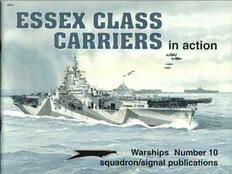
Essex Class Carriers in Action - Warships No. 10 PDF
50 Pages·1997·25.813 MB·English
Most books are stored in the elastic cloud where traffic is expensive. For this reason, we have a limit on daily download.
Preview Essex Class Carriers in Action - Warships No. 10
Description:
During World War II the United States twill three types of aircraft carriers, the Essex class heavy fleet carriers (CVs). the Independence class light carriers converted from cruisers (CVLs), and «escort» carriers, converted from merchant or tanker hulls (CVI-s). The 24 ships of the Essex class were not remarkable for any great design innovation, but essentially for being in the right place at the right time, and for doing well the task history gave them. Fourteen of the class saw action against Japan from 1943 to 1945, and all but the two most severelv damaged in the war saw extensive postwar action as licet carriers, antisubmarine cai ricrs. training carriers, and amphibious assaull ships. Despite its success, however, the Essex class was still unsatisfactory in many respects, ll was based on a class of ships restricted by treaty, its design was handicapped by a lack of operational experience, and it was forced to handle massive increases in aircraft size, antiaircraft armament and crew, all ol which resulted in serious overcrowding and overloading.
See more
The list of books you might like
Most books are stored in the elastic cloud where traffic is expensive. For this reason, we have a limit on daily download.
